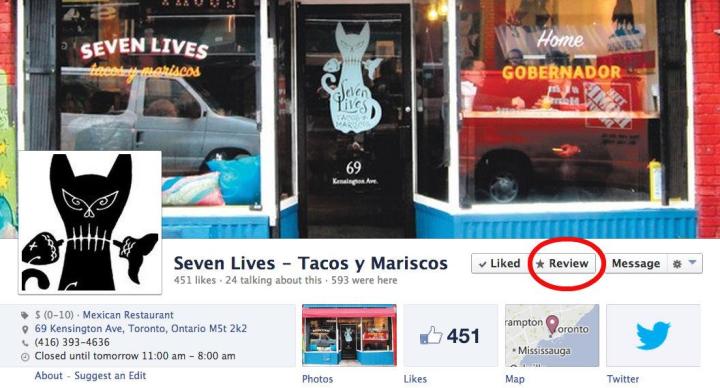
Do you want to be the Roger Ebert of social media food reviews? If so, now’s your chance: This week, Facebook added a “review” button for the Pages of Places. You can write about your amazing trip to the local seafood market or compose a scathing critique of the diner down the block’s shortcomings.
Step by step
Here’s how you do it: First, go to the page of a place you’ve visited. Below the picture but before the wall, nestled next to the “like” and “message” buttons, there it is — “review.”
Once you’ve located the review button, click on it. This will open a box where you can type a review, assign the place a star rating out of five, and then post the review. You can change the privacy settings (default is public) to any of the options available for your basic status update.

Here what it looks like once it’s published among the other reviews. They pop up on the righthand side of the place in question’s wall. My admiration for the best taco place in Toronto is not a minority opinion:

But is this going to work? Should Yelp be worried?
Facebook is attempting to engage users in a new way, and reviews fall perfectly in line with the company’s recent quest to encourage users to post public information. The reviews will provide more public data, which the company can always leverage. They will often reveal spending habits, another huge plus. And if Facebook users embrace the review button, it will give places even more of an incentive to pay to have their pages promoted, as well as buy ad space.
Moreover, this may be a bid to compete with Google, since the Google City Expert program is an effort to get users more engaged on Google+ by giving them rewards for composing ads. Of course, Facebook’s review function doesn’t have appealing rewards like free wine tasting excursions, so there’s certainly more of an incentive to post to the Google City Expert program. If Facebook attempted to implement a rewards program for its reviews, people would jump on that like crazy, since so many people regularly use the service anyways.
Facebook has a few advantages as it jumps into the review game. It already has a massive user base, and those users have grown accustomed to the idea of “liking” places they frequent, so getting them to review these places isn’t a stretch. And then places of business will want this function to succeed, because Facebook accounts are usually tied to a real identity, so if Facebook reviews become popular, it will likely be more difficult for shills to infiltrate than Yelp.
Additionally, Facebook’s social nature means posted reviews will be spread around friend networks, not just looked at by people already searching a specific restaurant or attraction, so the proprietors could end up getting free marketing. Since Facebook reviews are good news for proprietors, they may introduce incentives for people who write Facebook reviews, which could spur popularity growth for the function. And Facebook’s Graph Search may make it easier to pull up reviews for place pages (think searching “Thai places with five stars in Chicago”).
Of course, people still like Yelp. The company is doing better than ever when it comes to local and mobile ad strategies, and it’s in competition with FourSquare. It’s the established destination for online reviews. Plus, people like the option of reviewing semi-anonymously. The fact that these reviews are tied to your Facebook identity may actually be a deterrent for some users, since it’s harder to diss a place if your name is connected and your Facebook friends can see what you’ve written. So that may be a problem.
Facebook’s reviews are very easy to write, and if they catch on, they could seriously impinge of Yelp’s territory. Facebook may need to develop a way to rank local businesses and create ways for users to browse them according to neighborhood, category, and popularity, if it wants to mimic some of Yelp’s most valuable functionality.
Facebook has a lot to gain with these reviews, but if the company wants to become the online hub for local business reviews, it will have to expand on the current features.
Editors' Recommendations
- Amazon sues 10,000 Facebook groups over fake reviews
- Leading Dem says Apple, Google, Facebook, and Amazon have ‘monopoly power’
- Online platforms like Facebook are losing yet another ‘infodemic’ war
- You will soon be able to migrate your Facebook photos and videos to Google Photos
- Facebook launches interactive augmented reality ads that let you try on makeup

